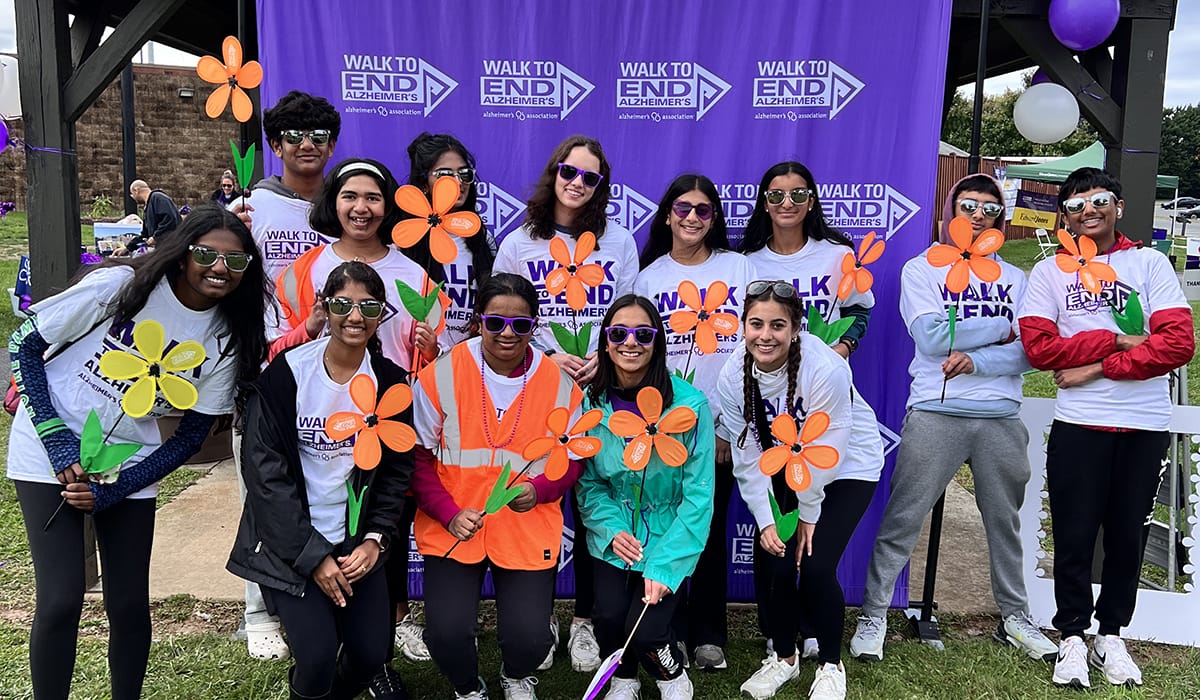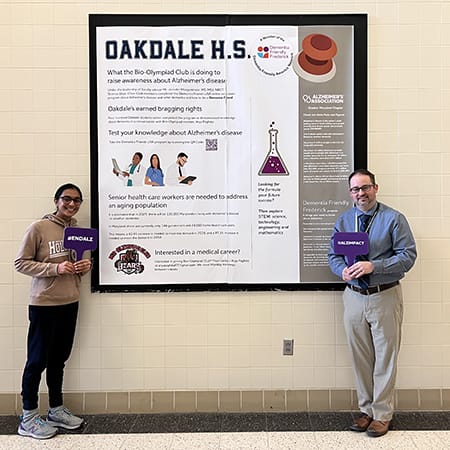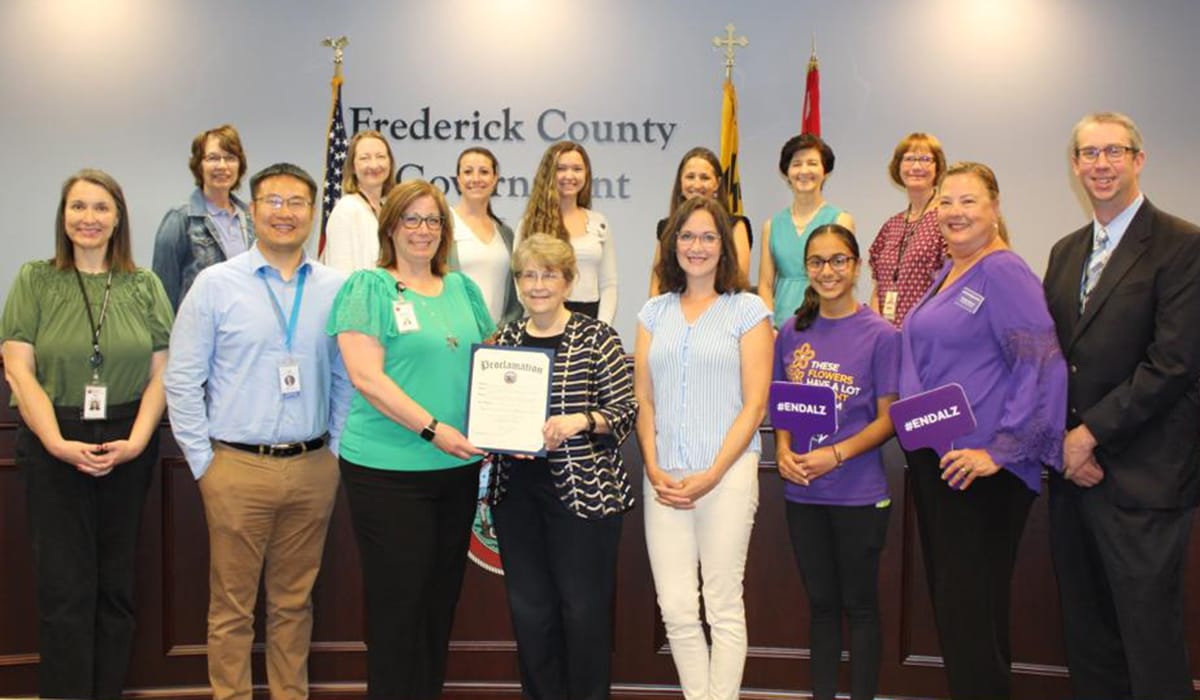Maryland Teen Makes the World a Little Easier for Alzheimer’s Patients and Raises Funds to End the Disease

Meet Daily Point of Light Award honoree Arya Paghdal. Read her story, and nominate an outstanding volunteer or family as a Daily Point of Light.
Arya Paghdal, a driven 16-year-old who loves to hike and cook, has also found a passion for volunteering and spotlighting young people’s voices. While her time is dedicated to many projects, one of which involves weekly English lessons for Ukrainian students, her interest in science and medicine leads her to dedicate time to the Alzheimer’s Association focusing on dementia awareness, decreasing stigma surrounding it and helping those diagnosed. She is the chair of the Youth Committee and serves as a team captain for her Walk to End Alzheimer’s team. Last summer, working directly with the residents of an assisted facility, she even designed and led an educational program that included things like exercise, meditation and an ice cream social.
Arya’s recent “Dementia Friends” project has brought hundreds of fellow students together to complete a national certification preparing them to recognize signs of and interact appropriately with people suffering from the disease. Recruiting a large group of young people to learn to engage with older adults with a memory disorder is no easy feat, but Arya’s compassion and enthusiasm shines through, her excitement motivating everyone around her to get engaged.

What inspires you to volunteer?
Volunteering has been deeply rooted in me since childhood. I grew up seeing my parents volunteering at the temple. We would be there from 8 am to 5 pm on Sundays. It showed me how much impact one can make on somebody else’s life. You’re able to light up people’s day and make them smile.
What inspired you to get started with this initiative?
I started my work with the Alzheimer’s Association in eighth grade. I came across a Walk to End Alzheimer’s “Be a team captain” ad. At the time, there were hardly any youth team leaders, so I took it on. Knowing that I want to go into science, it’s a great way to contribute. I’m a true believer that where we are today—technology and beyond—is because of the work the senior population has done, and I want to give back.
Tell us about your volunteer role with the Alzheimer’s Association – Greater Maryland Chapter.
I started as a member of the youth council for Walk to End Alzheimer’s where we plan the fundraiser walk each fall, which takes place in four to five locations across Maryland. We coordinate with about 10 youth on ways to raise money and recruit people to participate in activities for Alzheimer’s patients like coming to nursing homes and greeting them or hosting activities.
A year and a half ago, I became the chair of the committee, and now I lead meetings and generate new ideas. One new thing I implemented is care packages for nursing homes and patients with Alzheimer’s with basic essentials like toiletries and games to exercise their brain and stress balls so they have something to look forward to throughout the day. For the past four years, I’ve also been serving as the team captain, and we contributed $2,000-3,000 to the nearly $300,000 raised throughout Maryland this year.
What is the “Dementia Friends” project you’re leading?
It involves recruiting people to complete training to be able to help people in the community with dementia. An individual at our neighboring school had done this prior with 100 students, and I’m competitive. I have no social media, so my mouth is the most powerful tool that I have. I asked my friends who do have social media to spread the specific link to get to the certification on their platforms.
I’ve emphasized that you literally could be saving someone’s life by just consenting to help somebody with dementia, if and when needed. I gave the analogy of a CPR course. We’re not going to be doing CPR every day, but when and if needed, you’re able to. I think that stuck with a lot of the students who did it. We got 600 participants from my school in a month and a half and have been officially recognized as a “National Dementia Friend USA school”. Our goal is to get 1,000 of our school’s 1,700 students by the end of this year.

What are some things people should keep in mind when interacting with someone with dementia?
For one, keep in mind that it’s not necessarily going to be a fluid conversation. It might be awkward at many points, but try to stick with it. These seniors are still human with things to offer to society. I think a lot of times, they’re disregarded as not really able to contribute much. They need help with many things, but they’re very skilled people.
There are various stages of dementia. It can be really frustrating on their end to communicate sometimes. Be involved, but when some signals are being thrown around, take a step back and have their living assistant help with whatever situation is at hand.
What’s been the most rewarding part of your work?
If I had to choose, I would say when we went to an advocacy day for patients with Alzheimer’s at the county council. I was the youngest advocate at the meeting, and I was able to talk to the county executive and get her perspective on the work I’ve been doing. It’s rewarding to see that people appreciate the work I’m doing with my team.
What do you want people to learn from your story?
If you have something that you’re willing to go after, go after it. A lot of times, it’s a difficult journey, but if you’re willing to put in the effort, the results are going to show. Don’t get caught up in the obstacles that come along, because I guarantee they will come. Push forward and know that there’s something bigger than yourself out there.
Also, implement love and passion into whatever you’re doing. Keep in mind that there are people counting on you. The more of an impact we make, the more problems we can solve in this world.
Do you want to make a difference in your community like Arya? Find local volunteer opportunities.
